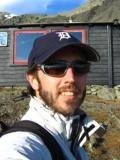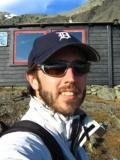“The U.S. must be the most difficult country to correct in the world. Americans are always open discussing values at a personal level, but when you mention opposition to the system, they think you are a communist” (Erik Dammann, 1989, from Wisdom in the Open Air, 215).
Saturday, May 26, 2007
Wednesday, March 14, 2007
More on being lost...
“A man that is lost and seems to be wandering has undoubtedly the best opportune to find his new calling” (reflection based on Arne Næss and Al Gore).
Sunday, March 4, 2007
Isak, immersed in the wilds
Saturday, March 3, 2007
Beautiful Sellanrå
“Look at you folk at Sellanraa, now; looking up at blue peaks every day of you lives; no new-fangled inventions about that, but fjeld and rocky peaks, rooted deep in the past – but you’ve them for companionship. There you are, living in touch with heaven and earth, one with them, one with all these wide, deep-rooted things…Look, Nature’s there, for you and yours to have and enjoy. Man and Nature don’t bombard each other, but agree; they don’t compete, race one against the other, but go together” (Knut Hamsun,1921, Growth of the Soil, page 428).
Friday, February 23, 2007
Wergeland and early norsk ecological poetry
“There is nothing, great or small,
that is fruitless, or decayed,
but its ending keeps a purpose,
however hidden that may be”
– Henrik Wergeland (1808-1845), from Follow the Call
Thursday, February 22, 2007
Carson and strength
“Those who contemplate the beauty of the earth find reserves of strength that will endure as long as life lasts” (Rachel Carson, unknown source, from Call of the Wild, 2002, pg. 100).
Saturday, February 17, 2007
Lost and finding the way
“I offer myself as a nature guide, exploring for values. Many before us have got lost and we must look the world over. The unexamined life is not worth living; life in an unexamined world is not worth living either. We miss too much of value” – Holmes Rolston (Light and Rolston, Environmental Ethics, 2003:143).
Impossible, unthinkable
"If we do not do the impossible, we shall be faced with the unthinkable" (Murray Bookchin, unknown source). –speaking in regards to an ecological disconnect.
Monday, February 12, 2007
More domination and table scraps
"In our own time we have seen domination spread over the social landscape to a point where it is beyond all human control. Compared to this stupendous mobilization of materials, of wealth, of human intellect, of human labor for the single goal of domination, all other recent human achievements pale to almost trivial significance. Our art, science, medicine, literature, music and ‘charitable’ acts seem like mere droppings from a table on which gory feasts on the spoils of conquest have engaged the attention of a system whose appetite for rule is utterly unrestrained" (Murray Bookchin, unknown source).
Friday, February 2, 2007
Singing into existence
“The philosopher Martin Heidegger said all we had to do was sing. You might have heard other things about him, good and bad, but remember he did say that the Earth needs humanity in order to sing it into existence, to give it word, name, not substance but story. Much as I too want to sing I can’t quite believe that. The world is wonderful because it doesn’t need me at all, except perhaps to save it from the sum total of human mistake” (David Rothenberg, Always the Mountains, pg. viii).
Sunday, January 28, 2007
Ibsen's human revolution
“We have been living on crumbs dropped from the revolutionary table of the preceding century. They have been chewed far too long. Thought requires new nourishment and stimulus. Liberté, Egalité et Fraternité no longer mean what they meant in the age of the guillotine. Bullheaded politicians make no effort to understand this. That is why I hate them. All they want is a political revolution, a particular revolution superficial in all things. Such a revolution is absurd. The important thing is renovation of the human spirit” (Henrik Ibsen wrote in a personal letter, taken from Choose Peace: A Dialogue Between Johan Galtung and Daisku Ikeda, 1995, pg 11).
Philosophers from the masses
“The truly great members of the masses of humanity are the people who labor not in the spotlight, but behind the scenes. I am most comfortable and can work most untiringly in the company of philosophers from the masses” (Daisaku Ikeda, Choose Peace: A Dialogue Between Johan Galtung and Daisku Ikeda, 1995, pg 6).
Friday, January 26, 2007
Good servant, but bad master
Friday, May 12, 2006
The value of spontaneous crazy experiences
Friday, May 5, 2006
Merely a strand in the web of life
Tuesday, May 2, 2006
Love for the earth, eachother, and those that follow
We plead that what we are capable of doing is
Not always what we ought to do.
We urge that all people now determine
That a wide untrammeled freedom shall remain
To testify that this generation has love for the next.
If we want to succeed in that, we might show, meanwhile,
A little more love for this one, and for each other.”
(Nancy Newhall, This is The American Earth, 1961; taken from Deep Ecology, pg 118)
Saturday, April 29, 2006
Modern science's ancient mentality towards nature
Thursday, April 27, 2006
"Prayer for the great family"
and to her soil: rich, rare, and sweet
in our minds so be it.
Gratitude to Plants, the sun-facing light-changing leaf
and fine root-hairs standing still through wind
and rain, their dance is in the flowing spiral grain
in our minds so be it.
Gratitude to Air, bearing the soaring Swift and the silent
Owl at dawn. Breath of our song
clear spirit breeze
in our minds so be it.
Gratitude to Wild Beings, our brothers, teaching secrets,
freedoms, and ways; who share with us their milk;
self-complete, brave, and aware
in our minds so be it.
Gratitude to Water: clouds, lakes, rivers, glaciers;
holding or releasing, streaming through all
our bodies salty seas
in our minds so be it.
Gratitude to the Sun: blinding pulsing light through
trunks of trees, through mists, warming caves where
bears and snakes sleep – he who wakes us –
in our minds so be it.
Gratitude to the Great Sky
who holds billions of stars – and goes yet beyond that –
beyond all powers, and thoughts
and yet is within us –
Grandfather Space.
The Mind is his Wife.
so be it. (Gary Snyder, Turtle Island, 1974, pgs 24-25)
Wednesday, April 26, 2006
Living with the earth - building the best character
It is to grow in the open air, and to eat and sleep
with the earth.
(Walt Whitman, Leaves of Grass; taken from Deep Ecology, pg 77).
Monday, April 24, 2006
St. Francis and natures democracy
See St. Francis's canticle "Brother Sun, Sister Moon"
Friday, April 21, 2006
Agressively confronting violence with only love at hand
Monday, April 17, 2006
The need for Deep Ecology (as explained by Devall and Sessions)
The Quiet Crisis
Santayana and the Genteel Tradition
Ecosystems and understanding the Self
Friday, April 14, 2006
Volunteerism as a strengthener to social change
Thursday, April 13, 2006
Alienation of humans from all nature via technology
Boredom and lack of wisdom
Self-realization and openness
To study the self is to forget the self.
To forget the self is to be enlightened
by all things.
To be enlightened by all
things is to remove the
barriers between one’s self
and others.
(Dōgen, taken from Deep Ecology, pg, 11)

